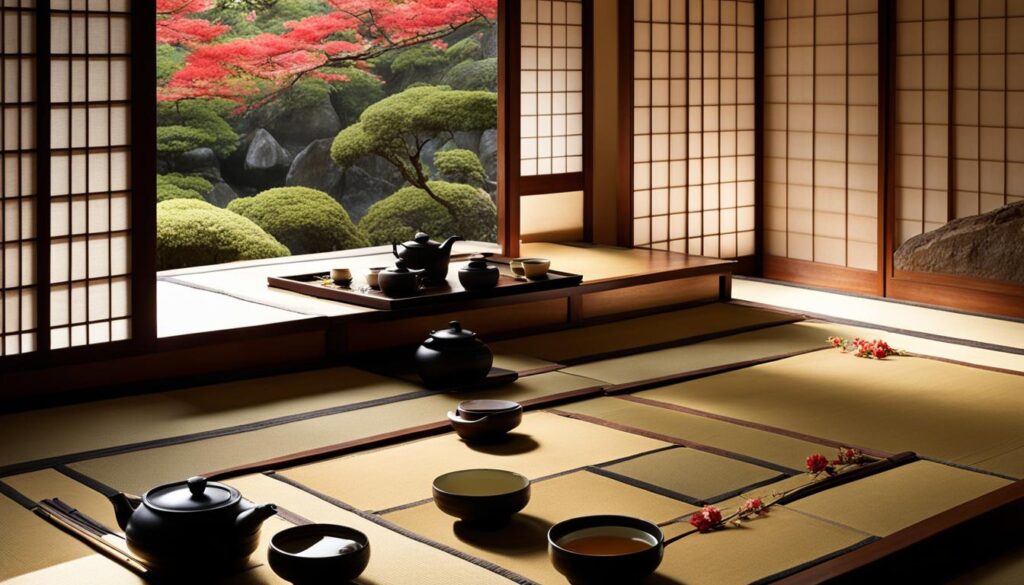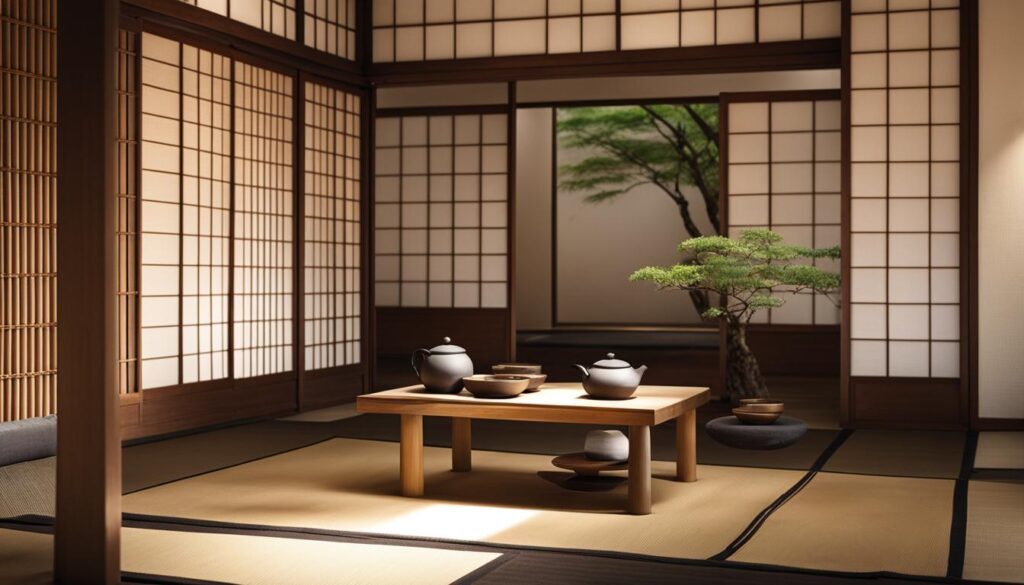
Zen and the Art of the Japanese Tea Ceremony: A Spiritual Approach
Welcome to our exploration of the fascinating world of the Japanese tea ceremony, where Zen philosophy weaves its way into every aspect of this ancient practice. Prepare to embark on a journey of mindfulness, tranquility, and self-discovery as we delve into the harmonious blend of Zen and tea.
Applying Zen principles to tea ceremonies is a centuries-old tradition that brings a deeper sense of purpose to the ritualistic preparation and consumption of tea. In this article, we will uncover the profound influence of Zen Buddhism in the tea ceremony and the teachings of the renowned tea master, Sen No Rikyu.
Join us as we discover how the principles of Zen, such as mindfulness, simplicity, and acceptance, infuse the Japanese tea ceremony with a spiritual essence that goes beyond mere tradition. From the serene tea rooms to the meditative act of pouring and savoring tea, we will explore how the tea ceremony offers a path to inner peace and enlightenment.
Key Takeaways:
- Zen philosophy and the Japanese tea ceremony are closely intertwined, both emphasizing mindfulness and simplicity.
- The principles of Zen, such as transience and selflessness, align with the values and practices of the tea ceremony.
- Sen No Rikyu, a prominent tea master, incorporated Zen teachings into the highly ritualized form of the tea ceremony.
- Harmony, respect, purity, and tranquility serve as the guiding principles of the tea ceremony.
- Integrating Zen principles into daily life can bring about a more mindful and peaceful existence.
The Influence of Zen Buddhism in Tea Ceremony
Zen aesthetics in Japanese Tea Ceremony
The Japanese tea ceremony is deeply rooted in the principles of Zen Buddhism. The influence of Zen can be observed in every aspect of the tea ceremony, from the ritualistic preparation and consumption of tea to the serene ambiance of the tea room. Zen philosophy emphasizes simplicity, mindfulness, and being present in the moment, all of which are reflected in the tea ceremony. As participants engage in the meditative process of making and drinking tea, they cultivate a sense of mindfulness and tranquility.
Zen philosophy in tea rituals
The tea ceremony becomes a practice of mindfulness, where participants focus their attention on each action, whether it’s pouring the water, whisking the powdered tea, or savoring each sip. The tea room itself is intentionally designed to be simple and devoid of distractions, creating an environment conducive to inner peace. Through the tea ceremony, individuals can experience a profound sense of Zen and apply its principles to their daily lives.
Zen and mindfulness in tea ceremonies: “The tea ceremony is a meditation in action, a way to find harmony and tranquility in the present moment.” – Anonymous
The Elements of Zen in the Tea Ceremony
Incorporating Zen principles, the tea ceremony embraces the concept of transience, reminding participants of the impermanence of life. The ceremony encourages individuals to fully immerse themselves in the present moment, letting go of worries about the past or the future. By accepting life as it is and finding contentment in simplicity, participants can cultivate a sense of tranquility.
| Zen Aesthetics | Tea Ceremony Rituals |
|---|---|
| Simplicity | Minimalistic tea room design |
| Mindfulness | Focus on each step of tea preparation |
| Transience | Embracing the impermanence of life |
| Serenity | Calm and peaceful atmosphere in the tea room |
The tea ceremony is a profound embodiment of Zen philosophy, allowing participants to experience a sense of harmony, tranquility, and mindfulness. It serves as a reminder to embrace simplicity and find beauty in the present moment, both during the ritual and in everyday life.
Sen No Rikyu and the Tea Ceremony
Sen No Rikyu, a renowned tea master, played a pivotal role in shaping the tea ceremony into its highly ritualized form. His deep understanding of Zen philosophy and aesthetics greatly influenced the practice, transforming it into a spiritual experience. Rikyu’s teachings emphasized the importance of harmony, respect, purity, and tranquility, guiding participants towards spiritual enlightenment.
“The true way of tea is to set one’s mind on that which is right in front of them, to fully immerse oneself in the present moment,” Rikyu once said.
To embody these principles, Rikyu meticulously designed every aspect of the tea ceremony, from the architecture of the tea house to the layout of the tea room and the utensils used. He believed that each element should reflect the beauty of imperfection and transience, known as wabi-sabi. The tea ceremony became not just a practice but a path to spiritual awakening.
With Rikyu’s Zen-inspired approach, the tea ceremony evolved into a profound expression of Japanese culture and philosophy. Its influence on contemporary tea ceremonies can be seen in the intricate tea room decor, the deliberate movements of the tea master, and the serene atmosphere that fosters mindfulness and tranquility. Through the tea ceremony, participants can connect with their inner selves and gain a deeper understanding of Zen teachings.
| Principle | Description |
|---|---|
| Harmony (Wa) | Emphasizes the balance and unity between participants, nature, and utensils. |
| Respect (Kei) | Promotes mutual respect and consideration, elevating everyday manners to a higher level. |
| Purity (Sei) | Focuses on cleanliness and the shedding of worldly concerns, both physically and mentally. |
| Tranquility (Jaku) | Creates a space for inner peace and calm through focused mindfulness. |
These four principles serve as the guiding philosophy of the tea ceremony, encouraging participants to live in the moment, appreciate the simplicity of life, and cultivate a sense of inner peace. By integrating Zen teachings into the tea ceremony and daily life, individuals can embark on a journey of self-discovery and find tranquility amidst the chaos of the modern world.

Discovering Zen in the Tea Ceremony
The tea ceremony is a gateway to the world of Zen, where one can experience the profound beauty of simplicity and mindfulness. As Sen No Rikyu once said, “In the art of the tea ceremony, we find our true selves and connect with the essence of existence.”
Zen Approach to the Japanese Tea Ceremony: The Four Principles of Sen No Rikyu
In the Japanese tea ceremony, the influence of Zen Buddhism and its principles is profound. Sen No Rikyu, a tea master of great significance, integrated Zen philosophies into the tea ceremony, transforming it into a highly ritualized practice. Rikyu established four guiding principles that serve as the philosophical foundation of the tea ceremony: Harmony (Wa), Respect (Kei), Purity (Sei), and Tranquility (Jaku).
These principles align closely with Zen teachings and provide a framework for participants to experience the tea ceremony with greater depth and mindfulness. Let’s explore each principle and its significance:
Harmony (Wa)
Harmony emphasizes the balance and unity between the participants, nature, and utensils involved in the tea ceremony. It encourages a sense of interconnectedness and appreciation for the present moment. By maintaining harmonious relationships and environments, participants can experience a heightened sense of peace and tranquility.
Respect (Kei)
Respect in the tea ceremony goes beyond mere etiquette. It elevates everyday manners to a higher level, promoting mutual respect among participants. Through practicing respect, individuals cultivate a sense of humility and appreciation for one another, fostering a deeper connection and understanding.
Purity (Sei)
Purity is not only physical cleanliness but also the shedding of worldly concerns, both physically and mentally. Participants strive to purify their thoughts and intentions, creating a space for pure and genuine interaction. By letting go of distractions and attachments, individuals can fully immerse themselves in the tea ceremony experience.
Tranquility (Jaku)
The ultimate goal of the tea ceremony is to create a space for inner peace and calm through focused mindfulness. Tranquility is achieved when participants embrace the present moment, letting go of worries and distractions. By cultivating a tranquil state of mind, individuals can find clarity and a deeper connection with themselves and the world around them.
Integrating Zen Principles into Daily Life
Applying Zen principles from the Japanese tea ceremony to our daily lives can bring a sense of mindfulness and tranquility. One way to do this is through the practice of Zen meditation in tea ceremonies. By taking the time to prepare and savor each cup of tea with complete focus and presence, we can cultivate a deeper connection to the present moment. As we engage our senses in the aromas and flavors of the tea, we can let go of distractions and find a sense of inner calm.
Another way to integrate Zen principles into our daily lives is through the creation of a Zen-inspired tea ceremony decor. By carefully selecting simple and minimalist elements, such as natural materials and clean lines, we can create a space that promotes serenity and a feeling of harmony. This decor can serve as a gentle reminder to approach each task and interaction with mindfulness and intention, inviting us to embrace the simplicity and beauty of the present moment.
“The tea ceremony is a reminder to be fully present, to notice the beauty in the simplest things, and to cultivate awareness in our everyday experiences.” – Tea Ceremony Master
By infusing our daily routines and interactions with Zen principles, we can foster a deeper sense of peace and understanding. Whether it’s sipping a cup of tea mindfully, creating a serene environment, or embodying the principles of harmony and respect in our relationships, the tea ceremony offers a path to grounding ourselves in the present moment and finding tranquility amidst the busyness of life.

The Benefits of Integrating Zen Principles into Daily Life
- Mindfulness and Presence: By practicing Zen principles, we can develop a greater sense of mindfulness and presence in our daily lives. This allows us to fully engage with each moment and cultivate a deeper appreciation for the present.
- Reduced Stress and Anxiety: The practice of Zen promotes a state of calmness and tranquility, helping to reduce stress and anxiety. As we apply Zen principles to our daily routines, we can experience a greater sense of peace and well-being.
- Enhanced Focus and Clarity: Immersing ourselves in the practice of Zen can help improve our focus and clarity of mind. By being fully present in each task, we can eliminate distractions and cultivate a greater sense of concentration.
- Improved Relationships: The principles of harmony and respect in the tea ceremony can be applied to our interactions with others. By embodying these principles, we can foster deeper connections and create a more harmonious and supportive environment.
Incorporating Zen principles from the tea ceremony into our daily lives is not only a way to find peace and tranquility, but also a means of personal growth and self-discovery. By embracing the values of mindfulness, simplicity, and being present in the moment, we can cultivate a more meaningful and fulfilling existence.
Conclusion
The Japanese tea ceremony, deeply influenced by Zen Buddhism, is not just about brewing and drinking tea. It is a profound practice that embodies the principles of Zen, such as mindfulness, simplicity, and being present in the moment. Through the guidance of tea masters like Sen No Rikyu, the tea ceremony has evolved into a highly ritualized form that elevates the act of making and consuming tea into a spiritual experience.
The principles of harmony, respect, purity, and tranquility serve as the philosophical compass of the tea ceremony. They guide participants on a transformative journey, leading to a deeper understanding of themselves and the world around them. By immersing themselves in the tea ceremony, individuals can awaken their senses, cultivate mindfulness, and find inner peace.
However, the influence of Zen and the tea ceremony doesn’t have to be confined to the tearoom. By integrating Zen principles into daily life, we can extend the practice beyond the ritual. We can embrace the values of transience, presence, selflessness, and acceptance in our actions and interactions. This allows us to cultivate a more mindful and peaceful existence, bringing harmony, respect, purity, and tranquility into every aspect of our lives.
So, let us take a moment to savor the wisdom of the tea ceremony and the Zen principles it embodies. Let us embrace the beauty of mindfulness, simplicity, and being present in the moment. By doing so, we can create a life that is not only steeped in tranquility but also reflects the profound teachings of Zen.
FAQ
How are Zen and the Japanese tea ceremony connected?
Zen and the Japanese tea ceremony are closely intertwined as both emphasize mindfulness, tranquility, and simplicity. The principles of Zen, including transience, presence, selflessness, and accepting life as it is, align with the values and practices of the tea ceremony. Tea ceremony masters are trained in Zen philosophy, and almost all Zen temples have tea ceremony rooms. The tea ceremony provides an opportunity for participants to find inner peace and gain a deeper understanding of Zen principles through the ritualistic preparation and consumption of tea.
What are the core principles of Zen reflected in the tea ceremony?
The core principles of Zen, such as simplicity, mindfulness, and being present in the moment, are reflected in every step of the tea ceremony. The practice of making and drinking tea becomes a meditative activity, with participants fully engaging their senses and focusing on each action. The tea room itself is often designed to be simple and free from distractions, providing a serene environment conducive to mindfulness and tranquility. Through the tea ceremony, participants can cultivate a sense of Zen and apply its principles to their daily lives.
Who was Sen No Rikyu and what role did he play in the tea ceremony?
Sen No Rikyu was a Japanese tea master who played a significant role in shaping the tea ceremony into its highly ritualized form. He incorporated Zen philosophies, wabi-sabi aesthetics, and a set of principles into the ceremony. Rikyu emphasized the importance of harmony, respect, purity, and tranquility in every aspect of the tea ceremony. He meticulously designed the architecture of the tea house, the layout of the tea room, and the utensils used, infusing each element with spiritual significance. Rikyu’s Zen-inspired approach transformed the tea ceremony into a practice that goes beyond mere tradition and becomes a path to spiritual enlightenment.
What are the four guiding principles of the tea ceremony by Sen No Rikyu?
The four guiding principles established by Sen No Rikyu are Harmony (Wa), Respect (Kei), Purity (Sei), and Tranquility (Jaku). These principles closely align with Zen philosophies and provide a framework for the entire tea ceremony. Harmony emphasizes the balance and unity between participants, nature, and utensils. Respect promotes mutual respect and consideration, elevating everyday manners to a higher level. Purity focuses on cleanliness and the shedding of worldly concerns, both physically and mentally. Tranquility is the ultimate goal, creating a space for inner peace and calm through focused mindfulness. These principles guide participants in their journey to fully experience and embody the tea ceremony.
How can Zen principles be integrated into daily life?
By embracing the values of transience, presence, selflessness, and accepting life as it is, individuals can cultivate a more mindful and peaceful existence. Taking time to engage in activities with full attention and focus, such as tea meditation or creating a Zen-inspired space in one’s home, can help foster tranquility and a deeper connection to the present moment. Incorporating Zen teachings into daily actions and interactions can help individuals find harmony, respect, purity, and tranquility in their lives.






